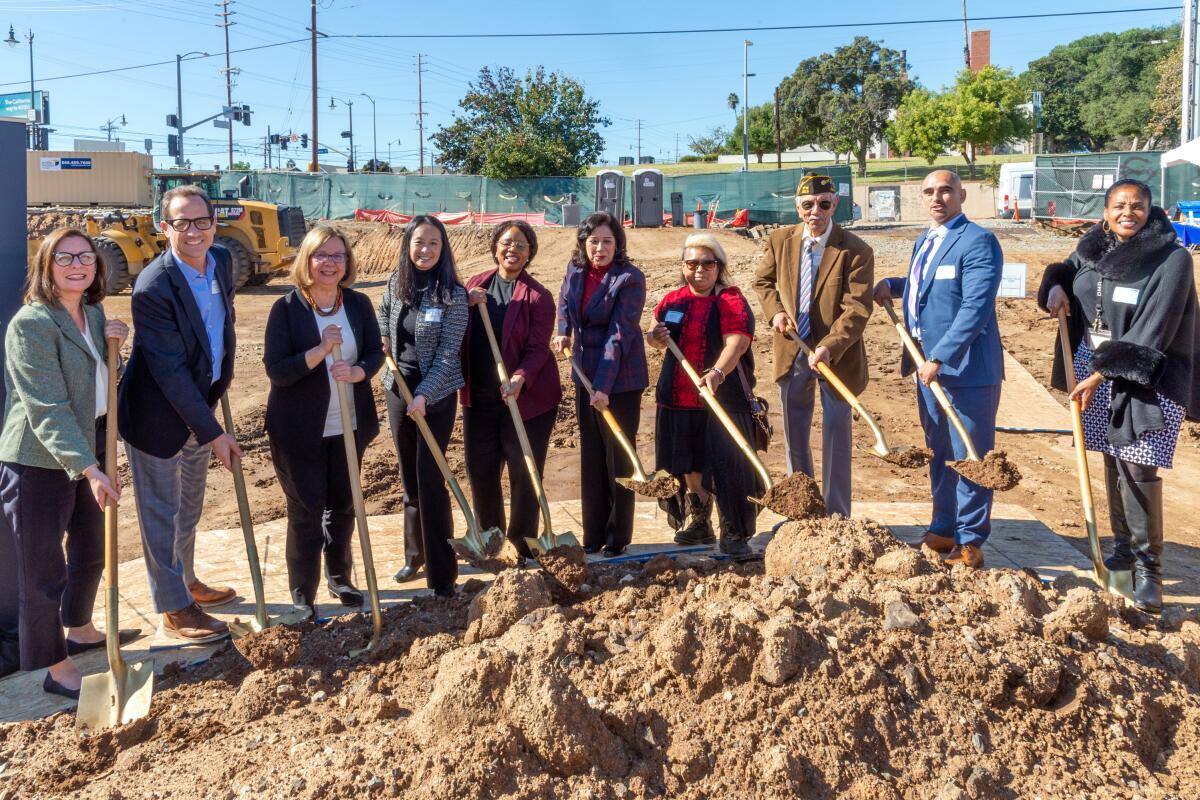Lorena Plaza housing project moves forward. For real this time

- Share via
At long last, the Lorena Plaza housing project moves forward.
That was the exultant headline on a Los Angeles Times editorial in March 2018 about a much-needed housing project for low-income veterans and homeless people with mental health problems.
In fact, construction only moved forward Thursday when Dora Gallo, the chief executive of A Community of Friends, the nonprofit developer and homeless services provider building the project, grabbed a shovel and posed for the ceremonial groundbreaking. That’s four years and eight months after that headline.
In a city of slow-moving developments for affordable and homeless housing, the Lorena Plaza project was spectacularly hobbled by a decade of obstacles: an obstructive city councilman, a deep-pocketed neighbor who sued to stop it, and an abandoned oil well underneath the parcel of land on a corner in Boyle Heights.
But the developer prevailed with support from the L.A. County Metropolitan Transportation Authority, the owner of the one-acre corner lot at East First and Lorena streets in Boyle Heights. “Metro hung in there the whole time,” Gallo said. The agency also granted several time extensions to negotiate the ground lease when the project stalled.
Some of the hurdles that slowed down development of Lorena Plaza have been fixed and won’t bedevil future housing projects.
For one thing, Jose Huizar, the former councilman who was the project’s biggest opponent, is gone (and currently facing trial, accused of taking bribes from developers). The project had the approval of the Boyle Heights Neighborhood Council but was opposed by the owners of the neighboring El Mercado shopping center and restaurant, as well as some nearby residents. Huizar was upset that Metro didn’t take his concerns about the project into account before approving it and that there wasn’t enough commercial space on the ground floor of the development. In response, Gallo increased the commercial space and made other changes requested by the community.
The city Planning Department approved the developer’s environmental analysis, but the El Mercado owners appealed that approval. A City Council land use committee had to hear that appeal — but Huizar, who chaired the committee, waited more than a year to schedule the hearing. That put the project on hold. Finally in 2018, Huizar dropped his opposition and the City Council approved the project.
Then El Mercado filed a lawsuit under the California Environmental Quality Act against the project, arguing that the developer needed to do a full environmental impact report on the land. A court ruled against El Mercado — but it took more than a year to get a court date and then a ruling. The El Mercado owners appealed the judge’s ruling but eventually dropped the appeal.
I know the perfect place in unaffordable L.A. to build new, beautiful affordable housing.
By that time, it was January 2020. Then the developer began the quest for funding — applying for Proposition HHH funds and state tax credits among other sources — and applying for housing vouchers for the project. The developer got the funding and also plugged the abandoned oil well to current standards. Finally construction is starting. Gallo says they expect the Lorena Plaza project to be ready for occupancy in early 2024.
But housing projects won’t face all of the same obstacles today. Now, the City Council is required to act on an appeal of a Planning Department environmental approval within 75 days.
Also, the state Legislature passed Assembly Bill 1197 in 2019, exempting from the California Environmental Quality Act any Los Angeles shelter or homeless housing project that gets funding from state and local sources, including Proposition HHH funding. So a project like Lorena Plaza would be exempt from the time-consuming lawsuit it faced from the El Mercado owners.
But there are still too many hurdles for homeless housing projects today, including neighborhood opposition, sluggish city permitting processes and the arduous process of applying for multiple sources of financing. Lorena Plaza is a mere 49 units — and only 32 of those would go to homeless individuals. (Veterans, who will make up half the project, can be homeless or low-income.)
There will always be reasons from neighbors for blocking housing for homeless people nearby: It will worsen traffic; there’s already a homeless housing development in the area; the location should be made a park; there’s a school nearby, and so on. But there are about 42,000 homeless people in the city of Los Angeles alone. At long last, 32 units are on their way. We just have to do this at least 1,000 more times.
More to Read
A cure for the common opinion
Get thought-provoking perspectives with our weekly newsletter.
You may occasionally receive promotional content from the Los Angeles Times.









